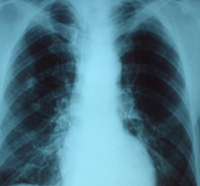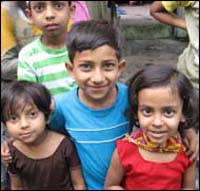Pneumonia Can Be Prevented - Vaccines Can Help
 Pneumonia is an infection of the lungs that is usually caused by bacteria or viruses. Globally, pneumonia causes more deaths than any other infectious disease. However, it can often be prevented with vaccines and can usually be treated with antibiotics or antiviral drugs.
Pneumonia is an infection of the lungs that is usually caused by bacteria or viruses. Globally, pneumonia causes more deaths than any other infectious disease. However, it can often be prevented with vaccines and can usually be treated with antibiotics or antiviral drugs.
Every 20 seconds, somewhere in the world, a child dies from pneumonia. Many of these deaths are preventable through vaccination and appropriate treatment.
What Is Pneumonia?

Chest x-ray of patient with pneumonia.
Pneumonia is an infection of the lungs that can cause mild to severe illness in people of all ages. Signs of pneumonia can include coughing, fever, fatigue, nausea, vomiting, rapid breathing or shortness of breath, chills, or chest pain. Certain people are more likely to become ill with pneumonia. This includes adults 65 years of age or older and children younger than 5 years of age. People up through 64 years of age who have underlying medical conditions (like diabetes or HIV/AIDS) and people 19 through 64 who smoke cigarettes or have asthma are also at increased risk for getting pneumonia.
Causes of Pneumonia
Encourage friends and loved ones with certain health conditions, like diabetes and asthma, to get vaccinated against the flu and bacterial pneumonia.
When bacteria, viruses or, rarely, fungi living in your nose, mouth, sinuses, or the environment spread to your lungs, you can develop pneumonia or other infections. You can catch the bacteria or viruses from people who are infected with them, whether they are sick or not.
Types of Pneumonia
You may have heard of community-acquired pneumonia (CAP). When someone who hasn't recently been in the hospital or another healthcare facility develops pneumonia, it's called community-acquired.
Send an eCard. Encourage someone with asthma or diabetes to get vaccinated against the flu and bacterial pneumonia.
Pneumonia is associated with healthcare when someone gets the infection during or following a stay in a healthcare facility (like hospitals, long-term care facilities, and dialysis centers). These infections are labeled healthcare-associated pneumonias, which includes healthcare-associated pneumonia (HCAP), hospital-acquired pneumonia (HAP) or ventilator-associated pneumonia (VAP).
In the U.S., the most common bacterial cause of pneumonia is Streptococcus pneumoniae (pneumococcus) and the most common viral causes are influenza, parainfluenza, and respiratory syncytial viruses. In children younger than 1 year of age, respiratory syncytial virus (RSV) is the most common cause of pneumonia. Other common bacterial and viral causes of pneumonia in the U.S. include Staphylococcus aureus and adenovirus. Pneumocystis jirovecii, a fungus formerly known as Pneumocystis carinii, is a common cause of pneumonia in patients with AIDS.
Reduce Your Risk
Pneumonia can be prevented with vaccines. Following good hygiene practices can also help prevent respiratory infections. This includes washing your hands regularly, cleaning hard surfaces that are touched often (like doorknobs and countertops), and coughing or sneezing into a tissue or into your elbow or sleeve. You can also reduce your risk of getting pneumonia by limiting exposure to cigarette smoke and treating and preventing conditions like diabetes and HIV/AIDS.
In the U.S., there are several vaccines that prevent infection by bacteria or viruses that may cause pneumonia. These vaccines include:
- Pneumococcal,
- Haemophilus influenzae type b (Hib),
- Pertussis (whooping cough),
- Varicella (chickenpox),
- Measles, and
- Influenza (flu) vaccine.

Globally each year, pneumonia kills more than 1.5 million children younger than 5 years of age.
National and Global Impact
In 2009, 1.1 million people in the U.S. were hospitalized with pneumonia and more than 50,000 people died from the disease.
Globally, pneumonia kills more than one and a half million children younger than 5 years of age each year. This is greater than the number of deaths from any other infectious disease, such as AIDS, malaria or tuberculosis. Access to vaccines and treatment (like antibiotics and antivirals) can help prevent many pneumonia-related deaths. Pneumonia experts are also working to prevent pneumonia in developing countries by reducing indoor air pollution and encouraging good hygiene practices.
More Information
- Pneumonia FastStats
- Vaccine Information
- Pneumocystis jirovecii pneumonia (PCP)
- Ventilator-associated Pneumonia (VAP)
- Quit Smoking
- World Pneumonia Day
Health e-Cards
Podcasts
- Preventing Pneumonia (A Cup of Health with CDC) [PODCAST - 3:31 minutes]
- In this podcast, a CDC expert discusses pneumonia in young children.
- Fighting a Bad Bug [PODCAST - 4:04 minutes]
- A CDC expert discusses the effectiveness of the pneumococcal conjugate vaccine.
- Immunizations Part I: Flu and Pneumococcal Vaccines [PODCAST - 5:44 minutes]
- This podcast discusses the importance of older adults protecting themselves against influenza and pneumonia through vaccinations.
- RSV (Respiratory Virus) for Young and Old [PODCAST - 4:37 minutes]
- In this podcast, a CDC researcher discusses RSV, a virus common in childhood and important in older adults.
Guidelines
- Community-Acquired Pneumonia (CAP)
- Healthcare-Associated Pneumonia (HCAP)
CDC works 24/7 saving lives and protecting people from health threats to have a more secure nation. A US federal agency, CDC helps make the healthy choice the easy choice by putting science and prevention into action. CDC works to help people live longer, healthier and more productive lives.
Get email updates
To receive email updates about this page, enter your email address:
Contact Us:
- Centers for Disease Control and Prevention
1600 Clifton Rd
Atlanta, GA 30333 - 800-CDC-INFO
(800-232-4636)
TTY: (888) 232-6348 - Contact CDC-INFO





